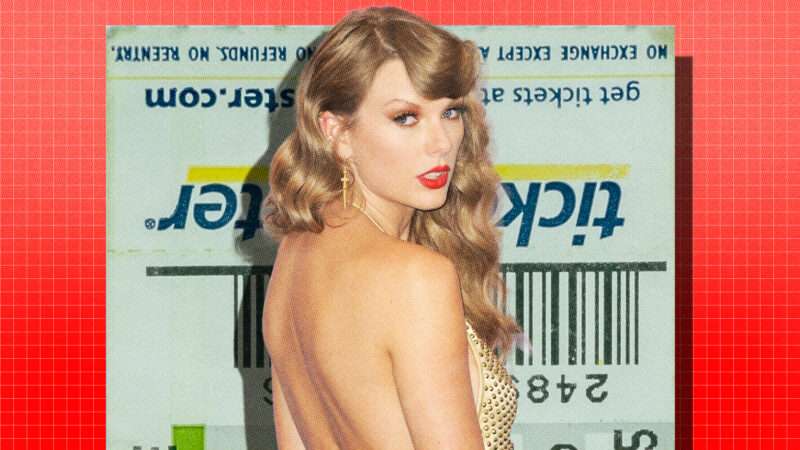
Back in mid-November, presale opened for mega pop star Taylor Swift's "Eras" tour. With 2 million tickets sold in one day, and pent-up demand due to her lack of tour dates since 2018, fans hustled to snap up tickets, crashing the Ticketmaster website.
Ticketmaster alleges it wasn't just fans trying to nab tickets, but also an unprecedented number of bots—most likely working on behalf of scalpers. Despite website glitches, 2 million fans got tickets for Swift concerts—"the most tickets ever sold for an artist in a single day," according to the company—and the general sale was subsequently canceled, as there weren't enough tickets left. Based on site traffic, Ticketmaster (which merged with Live Nation back in 2010 to create Live Nation Entertainment) calculated that Swift would have needed to play more than 900 stadium shows, or 20 times the number she is actually doing, in order to meet the extraordinarily high demand.
Enter Amy Klobuchar.
On Tuesday, Joe Berchtold, Live Nation's president, was trotted before the Senate Judiciary Committee to answer for Ticketmaster's purported misdeeds, which mostly involved its sheer bigness more than anything.
"This is all the definition of monopoly," said Sen. Amy Klobuchar (D–Minn.).
Klobuchar was referring to the company controlling roughly 70 percent of the market, and owning both a ticketing platform and many venues; competitors like Jerry Mickelson, an independent promoter, attested to the fact that "Live Nation can profit from concerts put on by rival promoters because it still makes money through its control of Ticketmaster," according to The New York Times. "'Pepsi doesn't earn money from Coke,' he said. 'But our competitor, Live Nation, makes money from selling tickets to our concerts.'"
This is how mergers work: Companies that formerly did one thing, or controlled a smaller share of the market, join forces with others to scale. To act like Live Nation/Ticketmaster is immune from competitive pressures ignores how new entrants like SeatGeek have threatened its dominance, as well as how government responses to the COVID-19 pandemic forced an almost two-year pause in hosting large events in many localities, which cut into its bottom line. Artists are free to abstain from using the company if they want to go through the additional work of securing venues, promoting a show, and selling tickets themselves.
Competitors "argued that Live Nation has locked out rivals by securing long-term ticketing contracts with major venues," per The Washington Post. "If arenas and other performance venues choose another ticketing company, Live Nation will not bring them popular acts, competitors alleged."
This would be a violation of the merger terms, but it is not clear that the threat is explicit enough to bring forth legal action. (The Justice Department and the company have been involved in a battle over this since 2019.) And of course competitors want to bring down the largest company in the space; SeatGeek's CEO, Jack Groetzinger, argued for the breakup of Ticketmaster and Live Nation as "the only way to restore competition in this industry." Everyone's acting in their self-interest.
Hmm. I've performed shows that weren't ticketed by Ticketmaster. You just have to do more of the work to find a venue, sound setup, & deal directly w/ venue. Artists actually have a choice here don't they? With Ticketmaster, you're paying for their marketing engine.
— David Choi (@DavidChoiMusic) January 25, 2023
Berchtold did acknowledge that there were some legitimate problems with the presale. "Technical problems also caused tickets to disappear from the online baskets of customers—whom Ticketmaster had approved through its Verified Fan system—as they were trying to buy them," noted The New York Times. But companies sometimes have websites that glitch, and senators made it clear that the whole event was not really about solving I.T. problems, but rather about breaking up what they see as a monopoly. Others called in to testify also attacked the company's size and power, arguing that the fees charged by the company are too high, with artists getting too little profit.
Like so many congressional hearings of large, successful companies, senators don't seem to have a commonly agreed-upon understanding of what Ticketmaster did wrong. Instead, they hectored Ticketmaster for glitching (a common problem that is not illegal and may in fact be punished by market forces if it persists); for taking too much profit (another thing that's not illegal); for being too large and successful (also not illegal, yet, though senators did threaten to attempt to unwind the 2010 merger). And they did so in the most performative, farcical way possible, by awkwardly reciting Swift lyrics clearly fed to them by their tween daughters ("She's cheer captain and I'm on the bleachers," said Utah Republican Sen. Mike Lee during one portion).
Artists and their management are free to do more of the legwork to organize tours themselves if they want to rake in more profits. But Ticketmaster/Live Nation provides a valuable service to artists, management, and fans, even if website glitches sometimes result in a horrific miscarriage of justice where some Swifties get denied tickets they would have liked to purchase. The Senate Judiciary Committee would be wise to remember that companies currently at the top don't stay there forever and that we live in a time of extraordinary, unprecedented abundance when this is the issue being investigated by sitting senators.
The post Ticketmaster's Taylor Swift Glitch Doesn't Require a Congressional Hearing appeared first on Reason.com.

.jpg?w=600)





